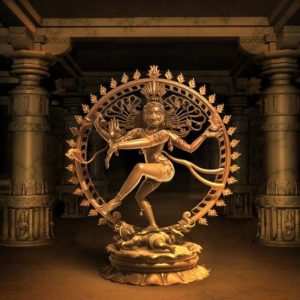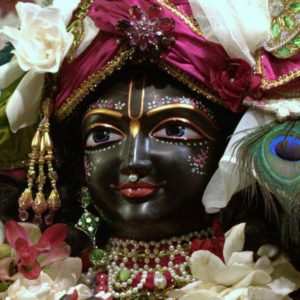न जानामि शब्दं न जानामि चार्थं
न जानामि पद्यं न जानामि गद्यम् ।
चिदेका षडास्या हृदि द्योतते मे
मुखान्निःसरन्ते गिरश्चापि चित्रम् ॥२॥
(Salutations to Sri Subramanya) I know neither Words, nor their Meanings O Lord. I know neither Poetry, nor Prose, but within the Core of my Heart, I see the Conscious Effulgence of Your Six Faces, which is making these various Words pour forth through my Mouth.
मयूराधिरूढं महावाक्यगूढं
मनोहारिदेहं महच्चित्तगेहम् ।
महीदेवदेवं महावेदभावं
महादेवबालं भजे लोकपालम्
(Salutations to Sri Subramanya) Whose Form Mounted on a Peacock represents the deepest Secret of the Upanishadic Maha Vakyas, Whose Heart-Stealing Beautiful Body Dwells within the Great Heart of Spiritual Consciousness, Who is the Great God of the Devas and represents what the Great Vedas convey, I Worship that Son of Mahadeva (another name of Shiva) Who is the Protector of the World.
Kārttikēya or Skanda or Murugan (as he is known in Tamil Nadu) is the god of warfare, the general of the Divine Army. In the earliest Vedic era he is seen to be synonymous with Agni whom the Rig Veda calls the priest of the sacrifice. Around 200 BC Skanda was a very popular god across the area of North India upto Afganistan. During the time of the Kushana period coins were struck with the image of this god of war. Kalidasa composed his famous poem Kumarasambhava on the story of Skanda’s birth.
Earlist depictions of Skanda show him with one head. Later on, in the post-Gupta era he is shown with six heads. The story of his birth relates the episode of how he was raised by the six ferocious warrior women identified with the constellation of Krittika, whose innate violence was tamed by Skanda they turned from being universally hostile to favorable protectors of humans.
Skanda is also identified with the term Guha. Guha, meaning cave, is a word used often in the Upanishadic literature to denote the place where the indwelling controller, the Antaryāmin resides. This marks a shift in popular perception of Skanda from being the leader of warriors to the granter of spirituality to his devotees. Arunagirinathar, a famous Tamil saint sings this in praise of Murugan who was his istha-devata.
You who has form and who is formless,
you who are both being and non-being,
who are the fragrance and the blossom,
who are the jewel and its lustre,
who are the seed of life and life itself,
who are the means and the existence itself,
who are the supreme guru, come
and bestow your grace, O Guha [Murugan]
—Kantaranuputi, Arunagirinathar.


